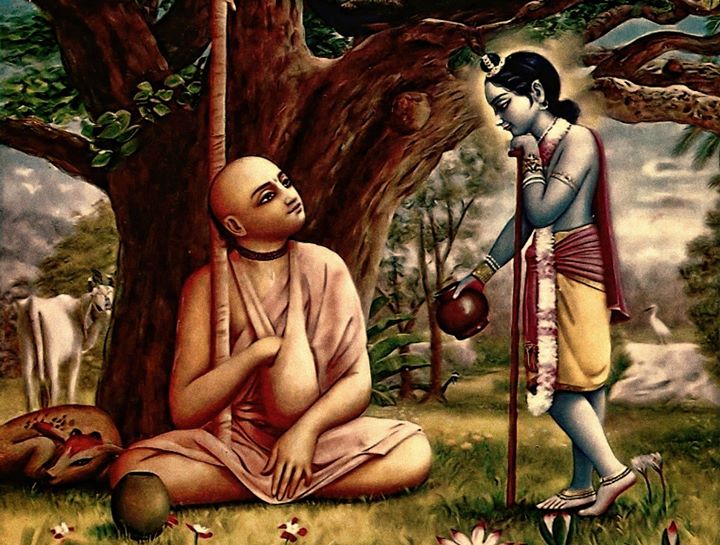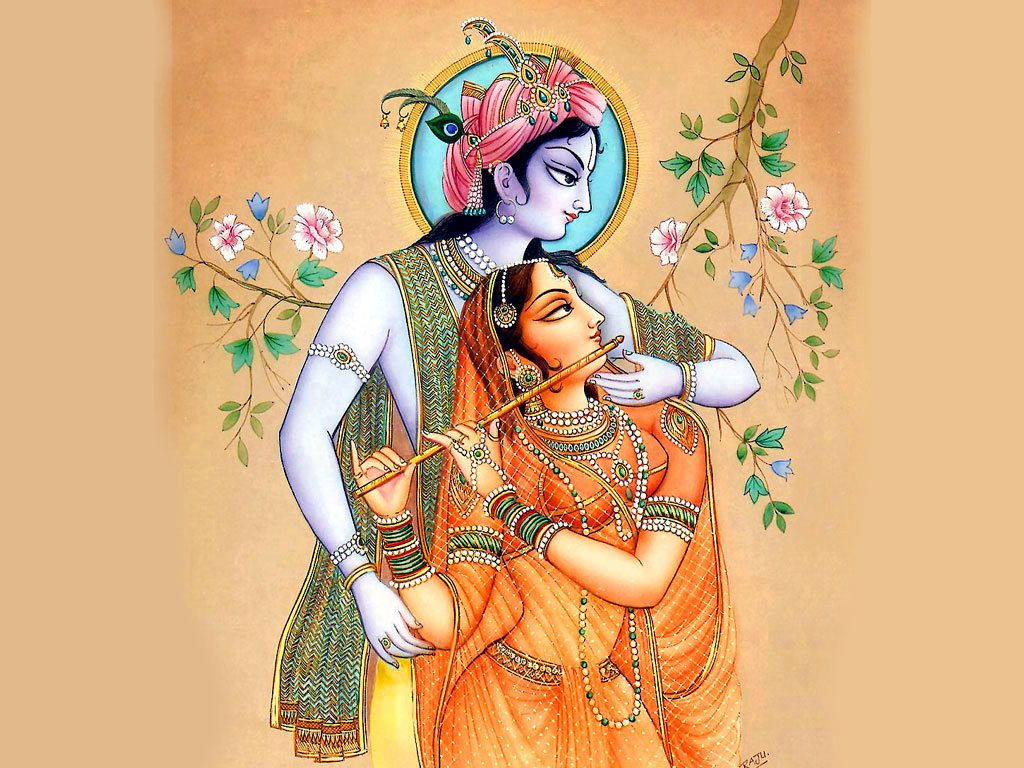This is part 15 of Bhagavad Gita Weekly series. In the previous part of this series, we looked at chapter 2 of the Gita, verses 48 to 51.
We stopped at chapter 2, verse 51 where Shree Krishna says, “endowed with such spiritual intelligence, those wise men who abandon their attachment to fruits of their actions certainly liberate themselves from the bondage of birth and death, attaining a state of complete tranquility.”
Shree Krishna asks Arjuna to work without ever being concerned about the results of the work, but simply for the sake of performing his duties – swadharma. The results of our actions are beyond our control and it is something that happens only in the future. We do not know what would happen in the very next moment, let alone the future. Instead of focusing fully on the duty at hand and the present moment, we are constantly think about what would be the outcome of what we are doing. Little do we recognise that, thinking about the future is the very cause of all our worries.
Shree Krishna says that, those wise men who work with such high spiritual intelligence, abandoning their attachments to fruits of their actions liberate themselves from all karmic reactions their actions create, thus attaining a complete state of tranquility.
Let us now continue from verse 52. You can read all the previous posts by clicking here and the very last one by clicking here.
Jump to the Commentary for Chapter 2, verses 52 to 56
Chapter 2, Verse 52
यदा ते मोहकलिलं बुद्धिर्व्यतितरिष्यति।
तदा गन्तासि निर्वेदं श्रोतव्यस्य श्रुतस्य च।।
yadā te moha-kalilaṁ
buddhir vyatitariṣyati
tadā gantāsi nirvedaṁ
śrotavyasya śrutasya ca
When your spiritual intelligence has passed out of the dense forest of delusion, you shall become indifferent to all that has been heard and all that is to be heard.
Chapter 2, Verse 53
श्रुतिविप्रतिपन्ना ते यदा स्थास्यति निश्चला।
समाधावचला बुद्धिस्तदा योगमवाप्स्यसि।।
śruti-vipratipannā te
yadā sthāsyati niścalā
samādhāv acalā buddhis
tadā yogam avāpsyasi
When your mind is no longer disturbed by the flowery language of the Vedas, and when it remains fixed in the trance of self-realization, then you will have attained the divine consciousness.
Chapter 2, Verse 54
अर्जुन उवाच
स्थितप्रज्ञस्य का भाषा समाधिस्थस्य केशव।
स्थितधीः किं प्रभाषेत किमासीत व्रजेत किम्।।
arjuna uvāca
sthita-prajñasya kā bhāṣā
samādhi-sthasya keśava
sthita-dhīḥ kiṁ prabhāṣeta
kim āsīta vrajeta kim
Arjuna said : O Keshava, what is the signs of one whose consciousness is thus merged in transcendence? How does such a person talk? How does he sit? How does he walk?
Chapter 2, Verse 55
श्री भगवानुवाच
प्रजहाति यदा कामान् सर्वान् पार्थ मनोगतान्।
आत्मन्येवात्मना तुष्टः स्थितप्रज्ञस्तदोच्यते।।
śrī-bhagavān uvāca
prajahāti yadā kāmān
sarvān pārtha mano-gatān
ātmany evātmanā tuṣṭaḥ
sthita-prajñas tadocyate
Lord Krishna said: O Partha, when one discards all selfish desires and cravings of the senses that torment the mind, and becomes satisfied in self realisation, such a person is said to be in pure transcendental consciousness.
Chapter 2, Verse 56
दुःखेष्वनुद्विग्नमनाः सुखेषु विगतस्पृहः।
वीतरागभयक्रोधः स्थितधीर्मुनिरुच्यते।।
duḥkheṣv anudvigna-manāḥ
sukheṣu vigata-spṛhaḥ
vīta-rāga-bhaya-krodhaḥ
sthita-dhīr munir ucyate
One whose mind remains undisturbed amidst misery, who does not crave for happiness or pleasure, and who is free from attachment, fear, and anger, is called a sage, a man of steady wisdom.
Commentary for Chapter 2, verses 52 to 56
Shree Krishna continues in verse 52, “when your spiritual intelligence has passed out of the dense forest of delusion, you shall become indifferent to all that has been heard and all that is to be heard.”
Earlier in verse 42 and 43 of chapter 2, Shri Krishna explained how people with limited understanding of the Vedas get carried away by the flowery words of the scriptures and think that, the only purpose of the Vedas is to attain more and more material possessions or even punya, so that, they can enjoy the heavens and all the pleasures that heaven offers.
However, such people do not seem to realise that the Vedas are not meant to attain the heavens, or more material possessions, or more punya for all of that is transient. But it was meant to eventually guide our individual consciousness to unite with the Ultimate consciousness, by transcending even the knowledge of the Vedas and attain a state of tranquility where we realise that, the only thing that is eternal is the knowledge of the Self / Atma. Everything else is transient.
Someone who has realised that truth, that the true and eternal knowledge is the knowledge of the self, is said to possess higher spiritual intelligence. Such a person abandons all delusions of life and learns the truth that, aham brahmasmi, that “I am brahman”, and becomes indifferent to every worldly objects worthy of hearing and yet to be heard.
Such wise men realises the eternal truth that I am not this body, but I am the atma which is eternal, and a part and parcel of the Whole, the Parabrahman and that the atma can neither be destroyed, nor be modified, even by the Gods.
When can I attain such a state of indifference to everything that is not truly me and attain divine consciousness? Shri Krishna explains that in the next verse 53, “when your mind is no longer disturbed by the flowery language of the Vedas, and when it remains fixed in the trance of self-realization, then you will have attained the divine consciousness.”
As one learns the scriptures, including the Vedas, we are meant to grow spiritually and seek for the ultimate knowledge which is the knowledge of our true self. Instead of getting carried away by the flowery language of the Vedas which instruct various rituals and mantras for numerous material benefits and fruitive results, one needs to recognize the true purpose of the Vedas which is to lead us towards the knowledge of our True self. That, I am not this body, but the atma that even gods can destroy.
Those who understand this essential truth about the Vedas remain fixed in the trance of self-discovery and self-realization and elevate their individual consciousness to attain communion with the Ultimate consciousness. Such a person transcends all the Vedas and enjoy true happiness and attain moksha from the cycle of birth and death – samsara.

One may wonder if it is an offense to not be enticed to such rituals offered by the Vedas. There are many examples of sages and saints proving that, it is definitely not an offense, rather it is about transcending even the Vedas and realising our transcendental nature.
For example, Madhavendra Puri (also known as Madhavendra Puri Goswami) who was a Vaishnava saint lived in the 14th century. Initially, he was involved in extensive Vedic rituals and practices. However, once after he took Sannyas – the order of renunciation – and engaged in wholehearted service of the God thereafter, wrote;
“I wish to apologize to all kinds of rituals as I have no time to respect them anymore. So dear Sandhya Vandanam (a set of ritual containing recitation of various Vedic mantras and followed by certain rituals), holy baths, sacrifices to the celestial gods, offerings to the ancestors, etc., please excuse me. Now, wherever I sit, all I remember is about Supreme Lord Shree Krishna, the enemy of Kansa, and that is sufficient to release me from the material bondage of various rituals.”
Likewise, one who realise their true nature, embrace their union with the divine and perfectly remain in a state of unwavering tranquility. Nothing can disturb such a mind situated in the service of Shree Krishna, the Supreme God, and such a person forever remains detached from all material objects and remains unaffected, and in true happiness.
Having listened to Shree Krishna’s explanations on why one must perform his swadharma without ever being concerned about the results of performing his duties (Karma Yoga), Arjuna is now curious to know the characteristics of such a wise man who has unwavering tranquility and have discovered their true nature.
Arjuna asks in the next verse (54), “O Keshava, what is the signs of one whose consciousness is thus merged in transcendence? How does such a person talk? How does he sit? How does he walk?”
Arjuna says, “sthita-prajñasya kā bhāṣhā samādhi-sthasya keśhava”. The words “sthita prajna” and “samadhi-stha” are usually used to describe enlightened souls. Arjuna is curious to know the nature of those enlightened souls and how their state of enlightenment manifests in their day-to-day behaviour.
Shree Krishna starts to explain the characteristics of such a person with higher spiritual intelligence and is immersed in transcendental consciousness from verse 55 till the end of the chapter 2. In the next verse (55), Shree Krishna says, “O Partha, when one discards all selfish desires and cravings of the senses that torment the mind, and becomes satisfied in self realisation, such a person is said to be in pure transcendental consciousness.”

As we know, we are forever going after material objects to find happiness even though we have seen from our own experiences that the happiness we find through external sources are temporary.
Because of our never ending cravings for transient objects of pleasures, the nature of human beings is often compared to “mriga trishna” in the scriptures by the sages. “Mriga trishna” is a metaphor for “the mirage seen by the deer”. Just like how a thirsty deer in a desert runs towards the illusory water only to find that, it nevers gets to the water as the mirage keeps moving farther and farther away, and eventually the deer collapses, parched and disappointed.
We are forever going after material objects to find happiness even though we have seen from our own experiences that the happiness we find through external sources are temporary.
Just like that deer who runs towards the illusory water, we are constantly running towards material objects hoping to find happiness and eventually we are disappointed out of exhaustion and completely forget the real purpose of our life.
Poonthanam Namboothiri, one of the famous Malayalam poet, born in 15th century explains this beautifully in the following lines in Jnanappana (you can read the whole article by clicking here…):
എത്ര ജന്മം പ്രയാസപ്പെട്ടിക്കാലം
അത്ര വന്നു പിറന്നു സുകൃതത്താല്!
…
ഓര്ത്തറിയാതെ പാടുപെടുന്നേരം
നേര്ത്തുപോകുമതെന്നേ പറയാവൂ.
അത്രമാത്രമിരിക്കുന്ന നേരത്തു
കീര്ത്തിച്ചീടുന്നതില്ല തിരുനാമം!
കീര്ത്തിച്ചീടുന്നതില്ല തിരുനാമം!
(Ethra janmam prayaasappettikkaalam
Athra vannu pirannu sukruthathaal!
…
Orthariyaathe padu pedunneram
Nerthu pokumathenne parayavoo.
Athra maathramirikkunna nerathu
Keerthicheedunnathilla thirunaamam
Keerthicheedunnathilla thirunaamam.)

In a nutshell, the poet says, ‘after so much struggle, going through various life cycles in the form of countless other creatures like worms, insects, fish, trees, etc., we finally get an opportunity to be born as human beings. And then, all we do is to run after material objects, neglecting the true purpose of our life which is to seek the knowledge of the Self through self-enquiry by chanting the names of God;
Krishna Krishna mukuntha janardhana
Krishna Govinda Narayana Hare
Achyuthananda Govinda Madhava
Sachithananda Narayana Hare…’
We are innately drawn towards our Whole, which is the Parabrahman. As explained by Shree Krishna before, we (atma) are part and parcel of the Parabrahman which cannot be destroyed or modified even by the Gods. One who realises this true nature of that Self / Atma, that “Aham Brahmasmi – I am Brahman”, voluntarily discards all material objects as they know that, none of the material objects bring lasting happiness, instead it only bring miseries.
Such a person is called enlightened soul – sthita prajna – who is fully satisfied with the realisation of their true self and is always situated in transcendental consciousness, being one with the Whole, the Parabrahman. They remain in pure blissful state, abandoning all cravings of the mind and is fully immersed in their soul, fully soul-satisfied, without any need to seek for happiness elsewhere, but contented with the happiness that comes from within.
We are innately drawn towards our Whole, which is the Parabrahman…
Shree Krishna continues in the next verse (56), “one whose mind remains undisturbed amidst misery, who does not crave for happiness or pleasure, and who is free from attachment, fear, and anger, is called a sage, a man of steady wisdom.”
A person who is fully soul-satisfied and is immersed in transcendental consciousness has their mind undisturbed even when they are met with distress. They neither crave for happiness or pleasure and are free from all kinds of attachments, fear and anger. Such a person is a man of unwavering wisdom and is called a Sage, a Sannyasin.
A sage is described by Shree Krishna as, “vita-raaga”, “vita-bhaya” and “vita-krodha”.
“Vita-raaga”, means that someone who has given up their cravings for all sorts of pleasures, “vita-bhaya” means that someone who is free from all fears and “vita-krodha” means that someone who is devoid of anger.
According to our scriptures, there are three kinds of distresses or calamities – a) Adhyaatmika – (physical) arising from disorder within one’s own body, b) Adhibhautika – (supernatural) arising from external objects such as that from a wild animal, demons, ghosts, etc. c) Adhidaivika – (natural) arising from the actions of great, cosmic forces which are beyond us, such as those which causes rain, storm and other natural calamities.
A sage is someone who is completely free from all these three kinds calamities as they are realised souls who have recognised their true self – that they are atma which is eternal and cannot be destroyed even by the Gods. They recognise that the only thing that can be destroyed by all these calamities is their body, not their souls. Thus, they are fearless too.
A sage is not only free from all kinds of calamities, but they also do not crave for happiness or pleasures, for they are immersed in a blissful state arising from within all the time.
We are all anu-sat, anu-chit and anu-ananda, and we originate from Sat Chit Ananda (sat-chit-ananda / satchitananda) – the Parabrahman which is pure bliss. One who recognises that eternal truth is a sage.
Not only that, a sage is someone who is also free from all kinds of attachments, anger and fear!
A person of such high spiritual intelligence and of such steady knowledge, has their mind fully in control, having recognized the truth that, “Aham brahmasmi”, that I am brahman!
As Shree Krishna explained earlier, a “sthita prajna” – one who is situated in perfect knowledge of transcendental consciousness – never see any difference between success or failures, victory or defeat, happiness or sadness, etc. as they realise that, none of that is real. The source of true happiness is when we recognise our own truth, that we are not this body, but the atma, which is undestroyable part and parcel of Parabrahman himself, which is Sat-chit-ananda!
A sage who is a man of steady knowledge is thus fearless. One who never fears death, fears nothing at all. We can overcome the fear of death only when we recognize our own truth that we are not this body that decays by each passing day, but the atma which is immortal and cannot be destroyed even by God, let alone another mere mortal.
We will continue from verse 57 in the next part. Let’s conclude here for now.
ॐ पूर्णमदः पूर्णमिदं पूर्णात्पुर्णमुदच्यते
पूर्णस्य पूर्णमादाय पूर्णमेवावशिष्यते ॥
ॐ शान्तिः शान्तिः शान्तिः ॥
Om Puurnnam-Adah Puurnnam-Idam Puurnnaat-Purnnam-Udacyate
Puurnnasya Puurnnam-Aadaaya Puurnnam-Eva-Avashissyate ||
Om Shaantih Shaantih Shaantih ||
My Pranams to you!
